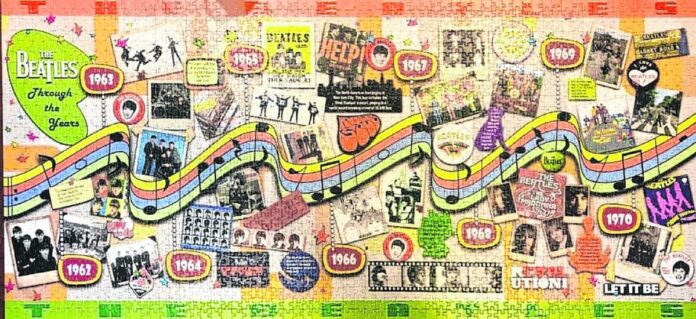
GREENFIELD — When it comes to completing jigsaw puzzles, James Lee and his son Aaron don’t mess around.
“From first touch, we can do a thousand-piece puzzle in two or three hours,” James Lee said. “And when it’s done, it isn’t five minutes before it’s back in the box and we’re off to Wal-Mart for another one.”
Since COVID-19 sent everyone home back in March of 2020, the jigsaw puzzle market has skyrocketed, with sales up 300 to 370 percent. Ravensburger, a German game and puzzle company, reportedly sold approximately 3.7 million puzzles in 2019, compared to 10.5 million in 2020 as the stay-at-home population looked for ways to fill long hours of family time. According to Statista.com, puzzle sales are expected to bring in $688 million dollars in 2021.
Kelley Holden, owner of Cynthia’s Hallmark along with her brother Cort Erwin, noticed the trend right away. When Cynthia’s shut down to in-person shopping on March 24, a lot of its curbside orders included puzzles.
[sc:text-divider text-divider-title=”Story continues below gallery” ]
Holden ordered four to five dozen copies of more than 25 different puzzles.
“Cort thought I’d gone to the looney bin,” Holden said. “He said there was no way we were going to sell all those puzzles. We sold everyone one of them.”
Machelle Poindexter rediscovered jigsaw puzzles as something that she, her mother and kids she babysits for could do together. Before COVID-19, Poindexter and her family sometimes did puzzles on holidays or over Christmas. When COVID hit, Poindexter said set up a table had a puzzle going most of the time.
Her mother, Betty Poindexter, 77, often came over to work on the puzzle with the kids.
“It keeps her busy — her hand-eye coordination — and keeps her mind busy,” Machelle Poindexter said.
Poindexter’s favorite puzzles are Disney-themed puzzles. She, her mother and the kids have completed around 25 since March.
Poindexter is apparently known for her love of puzzles.
“Everyone tagged me when the post (about people who are interested in puzzles) came up because we always post photos of us with the finished puzzle,” she said.
Brooke Palmer discovered that puzzles were a way to shift her focus from the stressful decision-making of being a small business owner.
“It gave me a break from the day-to-day stress,” said Palmer, who runs an insurance agency in Greenfield. “I have a table set up in the office that is just for puzzles.”
Nicole Bishop, a stay-at-home mother of five, started doing puzzles when the pandemic hit.
“I’ve found my jam,” she admits.
Bishop reserves the kitchen table for puzzles. It has since become a gathering place for her kids ages 8 through 17.
“They’ll come by, sit down and just linger,” Bishop said. “We have conversations.”
For Bishop herself, jigsaw puzzles are a welcome break from being a busy mom. She’ll set a timer for 10 to 20 minutes of puzzle-working time.
“I find when I have a puzzle set up,” Bishop said, “I’m less likely to waste time on social media.”
While everyone seems to have a favorite brand of puzzles — Bishop likes Galison puzzles, James and Aaron Lee like Buffalo puzzles.
“They’re really clean cut, with thick boarding,” Aaron Lee said. “The pieces fit together well. It’s just really satisfying.”
Whereas most people undertake a puzzle project by completing the straight-edged border first, Lee and son keep things interesting by sometimes doing a puzzle from the top edge down or from left to right. They’ve done puzzles that are all one solid color, edgeless puzzles and two-sided puzzles.
I guess you could say we’re chain puzzlers,” said Lee.
Where most puzzlers agree is what happens to puzzles after they’ve been finished and put back in the box: pass them on. The Lees resell their puzzles on Facebook or give them away. Nicole Bishop regularly exchanges puzzles with another puzzle-solving friend and recently joined a puzzle-exchange group on Facebook. Machelle Poindexter swaps out puzzles with her aunt, who eventually takes the twice-done puzzles to a local nursing home.
The universal rule seems to be, you give a puzzle, you take a puzzle. Puzzle culture — pass it on.



